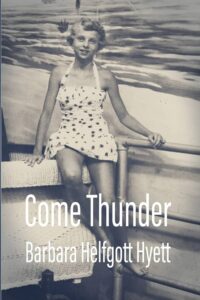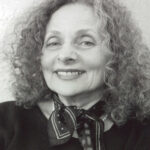Review by Shannon Vare Christin

Come Thunder
ISBN: 978-1957755045
2022, Lily Poetry Review
$8.00, 108 pages, paper
(sponsored post)
“Sometimes I make a poem of my life” is the core mantra embodied in this poetry collection, by Barbara Helfgott-Hyett. In Come Thunder, the speaker pulls us into three sections of a personal history connected by verse over the span of a lifetime.
Each section is distinctly separate, yet cohesively whole, as the childhood speakers tackle their gradual coming of age into their own power. In the poem, “Hire-Wire,” a defiant spirit is at work, even in the beginning childhood years, as the speaker is determined to live, thrive, and rebel despite the stacked odds: “I had to learn to fend the lions off, / had to learn to love them.” These skills come into play during the second half of Come Thunder when the adult speakers of these poems deal with overwhelming grief while still retaining the beauty that can exist in those moments. Rather than always fighting against the demons and obstacles at play, Helfgott-Hyett shows that we can harness their influence and take control of our own path.
Helfgott-Hyett is keen on utilizing enjambment to thread lines together into compelling narratives filled with collected details laden with specificity. These stories are told in snapshot style with each poem acting as one single record of the events contained within its lines. Each poem is structurally different in that they range in organizational style from single stanzas to multiple stanzas arranged into couplets, tercets, and quatrains. Within the single stanza poems, the speaker engages in a stream of conscious conversation with the reader. Whether she is offering a counterpoint to her teacher’s view of her good citizenship, as in “Report Card,” or she is contrasting normalcy with change, in “Last Evening,” each line spills over to the next one to complete the whole conversation.
The use of enjambment continues into the multi-stanza poems; however, the space in between each stanza generates suspense, movement, and rhythm. In “The Work of Shoes,” Helfgott-Hyett uses these techniques to great effect to create a steady playful rhythm until arriving at these last powerful lines: “No shoes allowed / to grieve a Jew. No Jew allowed / to be buried in shoes—too far to run.” The poem ends and we are left contemplating life and death, as witnessed through the commonplace item of shoes. Helfgott-Hyett expertly guides readers through contrasting themes and subjects, as she uses imagery to reveal subtle shifts from light to dark, happiness to sadness, and innocence to maturity.
The use of succinct, detailed imagery likewise transports the reader with scenes that pop off the page: “In the vineyard of this memory it’s a summer / Sunday, and the neighbors are coming to hear / my mother play her Schubert.” Additionally, the use of consonance here in the poem, “One Sunday,” emulates the musical qualities of the poem’s subject. Imagery and musicality work in concert with each other, as the speaker in “Rented” declares: “My brother— / who taught me / to dive in— / to breakers, / let myself / go under / come up to / prove I was / brave…” The speaker’s adventure with her brother continues: “how / I want to / click our kick- / stands down.” This syllabic verse conjures up the act of diving and swimming, the sounds of wildly biking, and the breathless energy of childhood summers.
Every poem in Come Thunder feels a lot like living, as the characters in the poems encounter each experience and stay there for a time, before moving on to the next adventure. The reader can attach to poems within this volume and absorb their nuanced meanings as they relate to their own lives. There are also visceral moments when the maturing speaker seizes her power, as told from the perspective of a “Painted Horse on the Carousel.” This horse vows: “I will not take the bridle. / Even if they press shut my snout. / Even if they pull my ears, pain / is the fury I thrive on.” She is powerful and resilient and will only live life on her terms: “My body stands where it is, / meets its assignments, life / by life. As I was made to. / As I want to.” Sometimes sheer emotion transcends articulation: “At the antipodes of the mind we are / more or less completely free / of language, wanting nothing of words / at all.”
By the time we reach the final third section, the now adult speaker takes on an authoritative tone of wisdom and knowledge, and shares ancestral advice braided into her own existence. The sea and stars are ever-present extended metaphors conveying the vastness of connections, insights, and existence itself. “Ice battered / the coast’s invisible tide. Nothing beyond. / Only out—out and far were all.” Philosophical wondering and longing punctuate this section as the speaker probes the universe to find her place in it. All that is certain is this innate sense of constant questions and infinite possibilities gathered to be mulled over, especially when the adult speaker deals with themes of mortality and grief. “There is no destiny until one turns, / looks back, every breath an echo / just as soon forgotten.” By the end, the speaker finds a semblance of an answer to these existential questions: “I will stay and be / made of staying / glad / to wake myself, like always, like / never before.”
Published in Cider Press Review, Volume 25, Issue 6.
See all items about Shannon Vare Christine
Visit Shannon Vare Christine’s contributors page.
See all items about Barbara Helfgott Hyett
Visit Barbara Helfgott Hyett’s contributors page.


 When not writing, Shannon Vare Christine devotes her time to teaching High School English in Bucks County, PA. For over 25 years, she has brought her passion for poetry and writing to her students. Most notably by hosting an Annual Student Open Mic Night, which has grown in popularity each year.
When not writing, Shannon Vare Christine devotes her time to teaching High School English in Bucks County, PA. For over 25 years, she has brought her passion for poetry and writing to her students. Most notably by hosting an Annual Student Open Mic Night, which has grown in popularity each year. Barbara Helfgott Hyett began writing in 1978, and published her first book, In Evidence: Poems of the Liberation of Nazi Concentration Camps, in 1986. She published widely in the years that followed, and her 1992 collection, The Tracks We Leave: Poems on Endangered Wildlife of North America, was a pioneer in the genre of ecopoetry. Her other books, Natural Law, The Double Reckoning of Christopher Columbus, Rift and Come Thunder have all received acclaim. Helfgott Hyett has twice received The New England Poetry Club’s Gertrude Warren Prize, and was a finalist for the Academy of American Poets’ Walt Whitman Prize and the Yale Younger Poet’s Prize. She has received numerous fellowships, including from the National Endowment for the Arts, Yaddo, The Boston Foundation, and others. She also served as a judge for the Elie Wiesel Foundation’s Ethics Prize for over 20 years.
Barbara Helfgott Hyett began writing in 1978, and published her first book, In Evidence: Poems of the Liberation of Nazi Concentration Camps, in 1986. She published widely in the years that followed, and her 1992 collection, The Tracks We Leave: Poems on Endangered Wildlife of North America, was a pioneer in the genre of ecopoetry. Her other books, Natural Law, The Double Reckoning of Christopher Columbus, Rift and Come Thunder have all received acclaim. Helfgott Hyett has twice received The New England Poetry Club’s Gertrude Warren Prize, and was a finalist for the Academy of American Poets’ Walt Whitman Prize and the Yale Younger Poet’s Prize. She has received numerous fellowships, including from the National Endowment for the Arts, Yaddo, The Boston Foundation, and others. She also served as a judge for the Elie Wiesel Foundation’s Ethics Prize for over 20 years. 


